Mutual Trust and Respect Creates Great Partnerships
“I’ve seen some great success stories over all these years working with this population!”
This article originally appeared in the Summer 2018 issue of NCIA News. For more information on NCIA News, please go to National Correctional Industry Association.
When he immigrated to the US in 1999 to work with an international produce grower with football-field sized green houses in eastern Arizona, David Leitch had no idea that he was about to start a partnership that would endure for nearly 20 years ─ and, hopefully for many more to come. There were significant challenges for an operation committed to providing low cost, cherry tomatoes and other specialty produce to big box stores across the country. There was the constant worry that the necessary water for cooling and nourishing the plants might not be available. There was the extreme heat of the Arizona summers. There was also the challenge of maintaining a workforce of hundreds of minimum-wage pickers and packers in the rural areas far from the metropolitan sprawl of Phoenix, where the green houses were located.
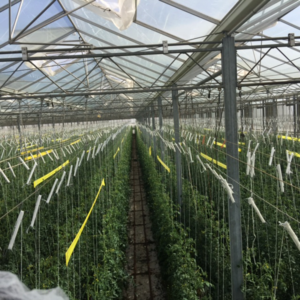
The engineers who designed the state-of-the-art greenhouses were able to conquer the challenges of the weather and local officials worked with management to ensure a dependable water supply. But they had to be even more creative to solve their labor issues. The labor force that came north from Mexico to work the fields during harvest seasons, were not always available and had to be continuously trained on operations in in the greenhouses. In desperate need of dependable and consistent staff year round, they quickly turned to Arizona Correctional Industries for a solution. The EuroFresh inmate labor program began in 1999 with 15-20 inmates per day and quickly grew to the point that, during the next 16 years, the inmate work crews averaged more than 240 per day, coming from three different complexes in eastern AZ.
Though he wasn’t part of the team that began the inmate labor program, Leitch soon recognized the many benefits of the partnership. With the buses arriving each morning, bringing well-trained workers who were grateful for the opportunity to learn how to grow and package produce on a massive scale, managers did not have to spend as much time training line staff as is typical in most operations that employ large, minimum-wage work crews. “It was important for these orange-clad workers to be able to get off the yard each day, commute to work, do real jobs!” Leitch recalls, “These guys were working together as a team, reaching production goals and, earning significant money (by prison standards). They could save up for their release, send some money home, pay restitution and child support and, even some of their room and board. Just like the rest of us. I remember one guy had saved up nearly seven thousand dollars by the time he was released!” “Over the years, as inmates were released and new ones joined the program, they were trained by other inmates. That’s how good they are,” explained Leitch, “Inmates were also training the civilians they worked side by side with.”
Back in the Phoenix area, upstart Papa John’s Salads and Produce was growing. Its huge production facility in Tempe (near downtown Phoenix) was no longer able to handle the volume of business they were doing with local grocery chain Fry’s and national ones like Safeway, Albertsons and Walmart. In 2010, they built a new operation center in Tolleson (20 miles west of Phoenix, just off route 10). Though this new facility gave them the space they needed to expand, it also made it more difficult to keep fully staffed. Luckily, the new opportunity David Leitch had found was as Papa John’s Vice President of Operations and he had some ideas on how to deal with that issue.
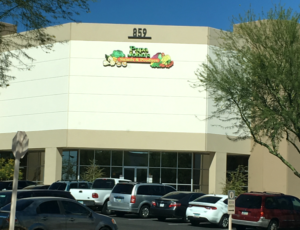
Reaching out to his contacts at ACI like Regional Managers Rich Selapack (since retired) and Mario Diaz (now Operations Bureau Administrator), Leitch wondered if it would be possible to bring in some inmate work crews at Papa John’s. Since it serves markets as far away as Denver, Colorado, and Salt Lake City, Utah, they would need a way to ensure that the items packaged by inmate crews were destined only for the Arizona market.
As they worked with ACI and (later) Arizona Department of Corrections (ADC) representatives to go over security issues and other regulatory requirements for bringing inmate work crews into a private company’s operations, they also put together a strategy to keep inmate produced items separate from those produced by the civilian work crews. Leitch knew which of the unique items that the plant produced went to the local markets and instructed his line managers to always have the inmate crews work on those items. They are regularly audited to ensure that these procedures are followed.
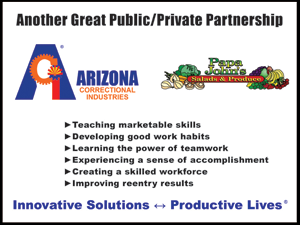
The inmate labor program started in 2015 with 15 – 20 and, as it continues to grow, it currently includes 30 male inmates from the Arizona State Prison Complex Lewis (ASPC- Lewis) working the day shift and 50 women from ASPC -Perryville working the night shift. Operations in the 203,312 square foot building go on 24 hours a day, seven days a week. Fruits, vegetables, sandwiches and salads are prepared and packaged throughout that grueling work cycle “except for four hours each day when every surface and work area is thoroughly sanitized,”
“A feature of our operations the ACI and ADC folks appreciate is our closed circuit monitoring of all the work and break areas and entrances,” Leitch explained, “Mario and Bruce [Shiflet, the Regional Manager currently supervising the Papa John’s contract] can connect to the system from their offices in Phoenix and watch the inmates crews all day long… if they want to.”
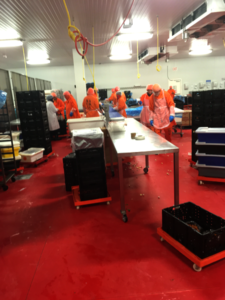
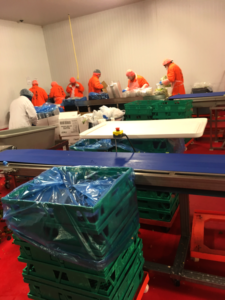
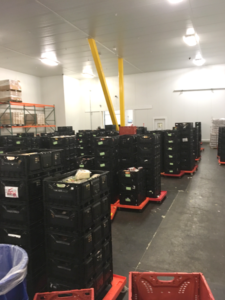
“But realistically,” Leitch continued, “they don’t need to watch that closely. The inmates on these work crews are very easy to manage: they show up every day, they want to learn all the ins and outs of the job their assigned to and what other opportunities they might be able to explore, they retain what they’ve learned and can train new inmates that are added to the crews, they know all the rules ─ and follow them (because they want to keep coming here each day), they don’t bring their home life baggage to the job.”
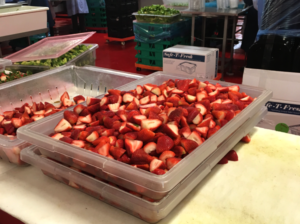
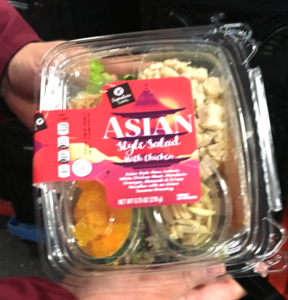
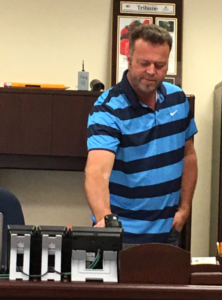
One worry for private businesses that might consider employing inmates is what their customers might think. “I’ve never had any pushback from our customers,” Leitch said, “I simply say that these folks are paying their dues, for whatever offense they may have committed, and if we can help give them some useful job skills, give them a chance to earn a bit of money so they can pay their restitution and their child support or whatever to family on the outside and save up some money for their release (so they don’t hit the streets with nothing) that’s just part of being a good corporate citizen.”
“I’ve seen some great success stories over all these years working with this population,” Leitch concluded, “in the last two years we’ve hired ten inmates after their release and they continue to be stand out members of our team. We are hoping to expand the inmate program as the opportunities arise and I know that ADC will work with us and ACI to help make that possible. Over the years I’ve seen that ADC has changed, they are now much more open to moving beds to accommodate new or expanding labor contract partnerships. It just makes sense to give as many inmates as possible the chance to do real work, earn something toward their debt and their future and help private businesses meet their staffing challenges.”
